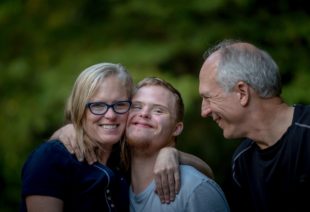Counseling for Parents with Special Needs Children
Christian Counselor Spokane
Parenting special needs children is not easy. It can be emotionally and physically taxing in a way others don’t understand. It’s also a gift and a chance to cherish every day in a way other parents may not. Special needs parents celebrate often, reframe their view of the world, and teach us all about grace. They’re also tired, often overwhelmed, and sometimes lonely.
 If you have a special needs child, we hope these words will encourage you. We hope you can share this post with your loved ones and friends. If you don’t have a special needs child, please keep reading. Hopefully, this will help you understand what it’s like for their families. We’ll dispel a few myths and misconceptions and share some things we hope parents (and those who love and support them) remember.
If you have a special needs child, we hope these words will encourage you. We hope you can share this post with your loved ones and friends. If you don’t have a special needs child, please keep reading. Hopefully, this will help you understand what it’s like for their families. We’ll dispel a few myths and misconceptions and share some things we hope parents (and those who love and support them) remember.
Common Misconceptions about Special Needs Children and Families
Parents who are not raising special needs kids sometimes have misconceptions and misunderstandings. It’s not because they’re trying to be stereotypical or rude. These happen because of a lack of education and knowledge.
As awareness grows, these start to disappear. Though there will always be misinformation, we can help dispel it, one person at a time. Here are a few common myths about special needs kids and families.
Myth: Special needs develop because of a lack of nurture.
While we don’t fully understand how they develop, it’s certainly not because the child was neglected or not loved.
Myth: Many parents choose not to parent their child.
We live in an era where extensive testing is available during pregnancy. Parents are often prepared during pregnancy for the struggles their children will have after birth. These parents chose to love, nurture, and raise their child.
Myth: This is the result of sin.
We’re so sorry if someone has told you this. Sin did not cause struggles for your child. Children with disabilities are not God’s punishment, they are beloved children of God.
Myth: Parents of special needs children don’t feel isolated.
Yes, there are a lot of support groups available. However, parents often find they don’t have the community support they’d like to have. Offering to fix a meal, babysit, help with errands, or even come over to visit may be a huge help for a parent.
 Myth: Special needs kids will be dependent on their parents for their whole lives.
Myth: Special needs kids will be dependent on their parents for their whole lives.
Many special needs kids grow up and are able to live independently.
Myth: Counseling is pointless.
Counseling is not a sign of weakness and it does not mean the family can’t handle it. This is an emotional and overwhelming journey. A counselor provides support, references for resources, fresh perspective, coping techniques, and a space to process emotions.
Myth: Special needs parents do not need to talk to people about their needs.
Learn to do so with tact. Approach it with a spirit of humility and a desire to help out. If you’re unsure of how to talk to them or what questions to ask, your counselor is a great person to talk to.
Myth: Special needs really just means autism.
We could do an entire article just about this. It encompasses anyone who needs assistance for any disability, be it mental, physical, emotional, or psychological.
Myth: Children should be defined mainly by what they can’t do or by their injury.
It will impact them, yes. Yet it is unfair to define them by their needs. Celebrate and relish in the accomplishments and milestones!
Myth: Children with disabilities will need special services in school.
Some children can be in a typical classroom with little to no adaptations needed.
Myth: You can always tell when someone has special needs.
Just as you cannot always look at someone and know right away that they have an autoimmune disease or cancer, you cannot always tell if someone has special needs by looking at them. It may not even be apparent through conversation and may only come up after forming a relationship with them.
Top Things Parents of Special Needs Children Need to Remember
Now that we’ve dispelled some myths, let’s talk about a few things that are important to remember. We hope these will encourage parents in your parenting journey. We also hope that friends, family members, and teachers will remember them. You can speak them in love to the special needs parent in your life when they’re having a hard day.
Care for yourself
 You give a lot of yourself every day. It can be easy to let yourself fade into the background. Perhaps one of the most important things to remember is to take care of yourself. Even if that means having a neighbor come over once a week so you can have a long bath and read a book for a while.
You give a lot of yourself every day. It can be easy to let yourself fade into the background. Perhaps one of the most important things to remember is to take care of yourself. Even if that means having a neighbor come over once a week so you can have a long bath and read a book for a while.
You don’t even have to leave the house. Drink plenty of water. Make sure you’re eating well and often enough. Take a shower. Give yourself a 5-minute meditation or yoga break. These small things add up.
Grieving is okay
There is a lot of loss in this journey. It’s ok to grieve the things that you’ll never get to experience with your child. Parents often feel this isn’t something they can do. While it can be very emotional, it’s a healthy process to go through. Your counselor can help you process this grief. Parents have found the process of Biblical lament to be helpful too.
Don’t ignore other children and the struggles they may be having
Special needs can take up a lot of time and energy. What parents may overlook or forget are the subsequent struggles siblings might be having. Your other children may be grieving as well. They may also feel jealous of the attention their sibling gets. Finding even 15 minutes a day of one-on-one time for siblings may be quite helpful in mending this. There are support groups, camps, and other opportunities available as well as counseling for siblings
Respite care is available
Hopefully, you’ve heard of respite care. If not, look into it. Respite providers have been trained and vetted. They provide parents a much-needed break and can also help out around the house and with appointments.
Diet or lifestyle changes may be necessary
 It can be easy to overlook diet and lifestyle when everything else feels overwhelming. Sometimes making changes in these areas has a benefit for kids. Your counselor may be able to help you identify lifestyle changes that can help. Your healthcare professional or a nutritional advisor can make suggestions for dietary changes. Eliminating gluten, sugar, and/or processed foods are the most common changes made.
It can be easy to overlook diet and lifestyle when everything else feels overwhelming. Sometimes making changes in these areas has a benefit for kids. Your counselor may be able to help you identify lifestyle changes that can help. Your healthcare professional or a nutritional advisor can make suggestions for dietary changes. Eliminating gluten, sugar, and/or processed foods are the most common changes made.
We’re learning more day by day
Research and knowledge are changing every day. Parents get frustrated because it feels like they are told something one day and something else the next. Please remember we’re all in this together and doing our best to get to know your family, your child, and the best ways to serve them.
God loves your precious child
Your child was made in God’s image. God loves them and wants to use them to teach the world about God’s love and grace.
Some children will have special needs forever, others will not
There are some needs that will remain lifelong. Others may remain for a season. In some cases, there may be two children with the exact same disability and one will persist lifelong and one will not. We’re learning more each day about why this happens.
Accept help
It’s okay to accept help. We know this can be hard. If no one is offering help, ask for it. Reach out to your church, your friends, or your neighbors. It may feel awkward at first but you’ll be so thankful you asked for or accepted, help. People don’t know what you need unless you ask. And people usually don’t offer help unless they’re sincere. Accept help to help your child and family thrive.
“All the Family”, Courtesy of Nathan Anderson, Unsplash.com, CC0 License; “Light Through A Tree”, Courtesy of Jeremy Bishop, Unsplash.com, CC0 License; “Smiley”, Courtesy of Pexen Design, Pexels.com, CC0 License; “Mother and Cygnet”, Courtesy of Magdalena Smolnicka, Unsplash.com, CC0 License





